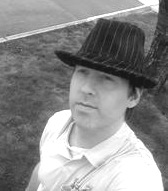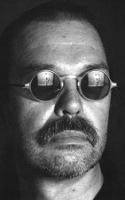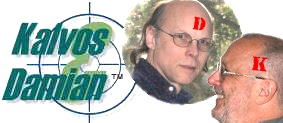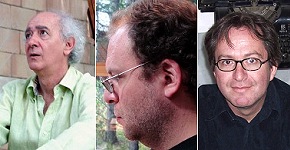 James Combs, composer… Ah, where to start?… I met James years ago, in our formerly-shared hometown of Seattle. Truly a “regular-Joe” in person, giving little hint of the ornate wheels spinning underneath. An anecdote on James’ blog seems a perfect illustration of the man and the work:
James Combs, composer… Ah, where to start?… I met James years ago, in our formerly-shared hometown of Seattle. Truly a “regular-Joe” in person, giving little hint of the ornate wheels spinning underneath. An anecdote on James’ blog seems a perfect illustration of the man and the work:
A Minimalist Experience
A boring Sunday, really not so much different than any other Sunday. March 16, 2008, I went for a drive to run some miscellaneous errands. My wife informed me that we were in some need of household items which could be purchased at the nearest store. So heading to the store on this boring Sunday, I am ever increasingly slipping slowly, steadily, into a trance state while driving. I am sure it was not unsafe, and I believe there is a name for it. Highway hypnosis. The condition where you arrive at your destination while not recalling much of the way there. I remember arriving at the store that boring Sunday and noticing the parking lot was quite full. This pulled me out of my trance to an irritating degree. Not finding one parking spot, my wife decided to run in and get the couple of items and I would simply drive around the parking lot until she made her way back outside. So I started driving steadily, cautiously through the parking lot which went in a round about. The first loop, I was concerned with looking out for other cars, but I have to say by the time I made it to my second lap I was really feeling the track, memorizing all the angles. By the time I hit the third lap I was steering around vehicles and halting with expert dexterity for crossing traffic through the parking lot, the track. I can’t remember what lap I was on when my cell phone rang and woke me up from my hypnotic state. It was my wife wondering why I kept driving past her, waiting outside the front of the store.
Self-taught, James writes smallish, fairly static, elegant and polished yet absolutely irrational piano pieces. Pieces from another century’s drawing room — though that century could only be invented in the here and now. Maybe if we overlayed glass slides of Chopin, Satie, Stravinsky, Feldman, Glass, Eno, then maybe… Each small piece has the quality of a Mark Ryden painting; antique poise and luminescence recalled in a disturbing dream from just last night. James makes no claims to intrude on Brian Ferneyhough’s turf; yet for all their simplicity these modest piano pieces show the most wonderful intuition for line, sonority, weight and color, all at just the right moment. I suppose we could call the pieces “etudes”, but what they teach would be philosophical rather than technical. There’s also a kind of deadpan humor, a bit of Buster Keaton or even Steven Wright (“I went to a restaurant that serves ‘breakfast at any time’. So I ordered french toast during the Renaissance.”) running through the whole ethos. So what kind of music is this? Again, I’ll let James explain:
“Classical” … The meaning of this word pertaining to music obviously is defined as a musical form. So what is this meaning? Ask any average guy and he would probably say “like what Mozart and Beethoven composed.” Hey, he would be absolutely correct. I mean, there was an age long ago termed the “classical period.” This period was defined not only within the music, but paintings, architecture, poetry, etc.
So if you ask the average “Joe” what contemporary classical is, they might scratch their head and reference ? I mean, most likely. And that’s the problem. Is rock a period? Is jazz a period (I know about the age, but we’re talking music)? The term “classical” is a definite problem. It links the past to the present under false pretenses. Imagine Philip Glass or Steve Reich being asked “what genre of music to you compose for?” They answer “impressionism.” That is if we swap out the word classical in favor of the word impressionism, both a period so would it matter?
Does the use of the word classical as a blanket definition of all eras of this form in turn form a bias within academia and elitists? Meaning, to pick classical as the word might say to some that the era of classical itself is the most relevant to every genre. Here in Seattle our “classical” radio station rarely strays (some might say deviates) from the baroque, classical and romantic eras. I would bet that to be the case for every metropolitan city around the world.
Do you want a solution? Take out “classical” as the definition of all periods in aforementioned music and replace with “amaranth.” An unfading flower.
I compose amaranth music. I compose amaranth music in a contemporary style.
James first self-produced CD release, Charmed Elixers, is available now on both CD Baby and iTunes.
 Lazy, hazy summer days… Not much really happening, unless you hoof it to some festival or other… Or, for the price of simply wearing out your finger clicking, you could spend the better part of the next couple weeks feasting on the treasure trove that is the Other Minds website.
Lazy, hazy summer days… Not much really happening, unless you hoof it to some festival or other… Or, for the price of simply wearing out your finger clicking, you could spend the better part of the next couple weeks feasting on the treasure trove that is the Other Minds website. Though Kalvos (Dennis Bathory-Kitsz) and Damian (David Gunn) last appeared in 2005, they more or less pick up just where they left off, with an fun interview of the muy importante left-coaster
Though Kalvos (Dennis Bathory-Kitsz) and Damian (David Gunn) last appeared in 2005, they more or less pick up just where they left off, with an fun interview of the muy importante left-coaster 
 Robert Gable at his
Robert Gable at his  James Combs, composer… Ah, where to start?… I met James years ago, in our formerly-shared hometown of Seattle. Truly a “regular-Joe” in person, giving little hint of the ornate wheels spinning underneath. An anecdote on James’
James Combs, composer… Ah, where to start?… I met James years ago, in our formerly-shared hometown of Seattle. Truly a “regular-Joe” in person, giving little hint of the ornate wheels spinning underneath. An anecdote on James’  The International Contemporary Ensemble (ICE) hosts a celebration of composer Julio Estrada and three generations of New Music from Mexico. This May 2–7, ICE invites New Yorkers to partake in a trailblazing cultural exchange when it hosts this six-day celebration of avant-garde music from Mexico. The Festival will showcase the work of three generations of Mexican composers: esteemed musical pioneer Julio Estrada; the second generation, his celebrated mid-career students Germán Romero and Ignacio Baca Lobera; and 10 up-and-coming composers, all of whom have studied with or have been influenced by the three masters.
The International Contemporary Ensemble (ICE) hosts a celebration of composer Julio Estrada and three generations of New Music from Mexico. This May 2–7, ICE invites New Yorkers to partake in a trailblazing cultural exchange when it hosts this six-day celebration of avant-garde music from Mexico. The Festival will showcase the work of three generations of Mexican composers: esteemed musical pioneer Julio Estrada; the second generation, his celebrated mid-career students Germán Romero and Ignacio Baca Lobera; and 10 up-and-coming composers, all of whom have studied with or have been influenced by the three masters.